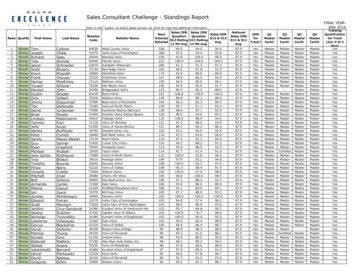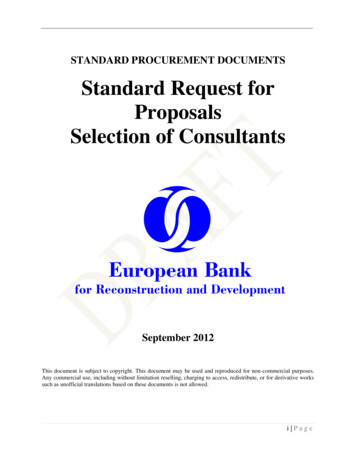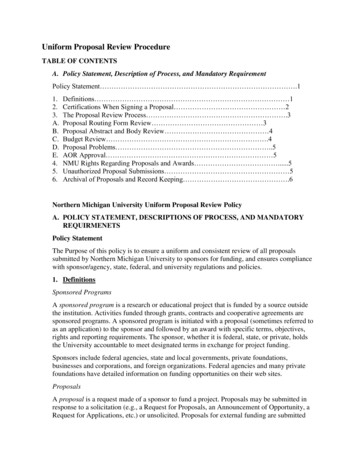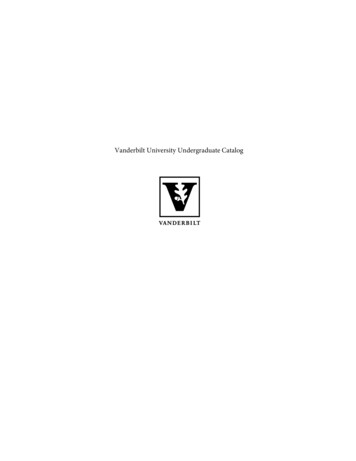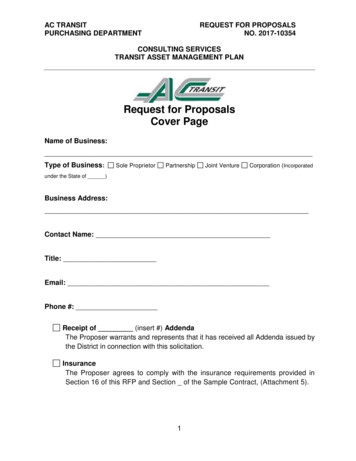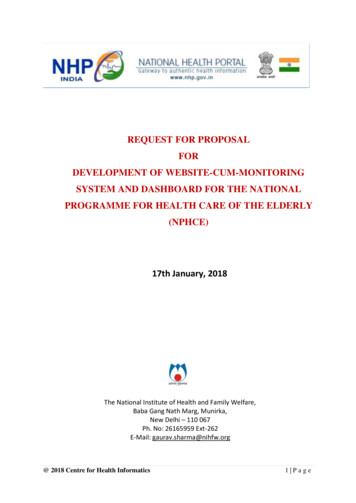
Transcription
CAAL5/2/2013Agenda Item 3qNew Program ProposalMaster of Science in Nursing, Clinical Nurse LeaderUSC UpstateSummaryThe University of South Carolina Upstate requests approval to offer a program leading tothe Master of Science degree in Nursing, Clinical Nurse Leader, to be implemented in Fall 2014.The proposed program is to be offered through online instruction. The institution currentlyoffers a program leading to the Bachelor of Science degree in Nursing. The following chartoutlines the stages for approval of the proposal; the Advisory Committee on Academic Programs(ACAP) voted to recommend approval of the proposal to the Committee on Academic Affairsand Licensing (CAAL). The full program proposal is attached.Stages of ConsiderationProgram Planning Summaryreceived and posted rogram Planning Summaryconsidered at ACAP10/11/2012Program Proposal Received2/25/2013Comments and suggestionsfrom CHE staff to theinstitution2/25/2013Revised Program Proposalreceived2/26/2013Program Proposal posted toACAP members for review2/28/2013CommentsStaff suggested strengthening the justificationand need sections by including more data,specifically state and regional data, to supportthe need for the proposed program anddiscussing in more detail the plannedcollaboration with USC Aiken.ACAP members suggested adding moreinformation about availability of clinical sites.CHE staff encouraged USC Upstate tocollaborate with Lander rather than offer acompeting program.The institution was allowed to submit theproposal after the deadline so that MSN CNLprograms proposed by USC Upstate andLander could be considered by ACAP andCAAL at the same time.Staff suggested revising the faculty table forconsistency; discussing the electronic libraryresources available to students since theproposed program will be offered online,including listing a selection of nursing titlesand databases available to students online;identifying reallocated funds; and describingcommunications with Lander regardingpossible collaboration.Revisions to information provided aboutfaculty, library resources, clinical sites, andpossible collaboration.USC Upstate, M.S.N., Clinical Nurse Leader, Program Proposal, CAAL 5/2/2013 - Page 1
CAAL5/2/2013Agenda Item 3qACAP Consideration3/21/2013ACAP members discussed the issue ofcollaboration with Lander’s proposedprogram at length and ultimately decided thatcollaboration was not necessary because ofsufficient demand to support both programs.RecommendationThe staff recommends that the Committee on Academic Affairs and Licensing commendfavorably to the Commission the program leading to the Master of Science degree in Nursing,Clinical Nurse Leader, at USC Upstate to be implemented in Fall 2014, provided that noadditional “unique cost” or other special state funding be required or requested.USC Upstate, M.S.N., Clinical Nurse Leader, Program Proposal, CAAL 5/2/2013 - Page 2
New Program ProposalUniversity of South Carolina UpstateMary Black School of NursingMaster of Science in NursingConcentration: Clinical Nurse LeaderDate of SubmissionThomas Moore, ChancellorUniversity of South Carolina UpstateHarris Pastides, PresidentUniversity of South CarolinaProgram contact:Dr. Katharine M. Gibb, Interim DeanMary Black School of Nursingkgibb@uscupstate.edu864-503-5444USC Upstate, M.S.N., Clinical Nurse Leader, Program Proposal, CAAL 5/2/2013 - Page 3
ClassificationProgram Title: Master of Science in NursingConcentration: Clinical Nurse LeaderAcademic unit: Mary Black School of NursingDesignation, type, and level of degree: Master of Science in NursingProposed date of implementation: August 2014CIP code from the current USDOE's Classification of InstructionalPrograms: 51.3820Identification of Program as New or Modification: NewSite: University of South Carolina UpstateProgram qualifies for supplemental Palmetto Fellows Scholarship and LIFEScholarship awards: Yes No: XDelivery mode: Online didactic; onsite clinicalArea of Certification: Clinical Nurse Leader Certification through the Commission onNursing Certification (CNC)Institutional Approval and date of approval1. School of Nursing Graduate CommitteeDr Angie Davis 1/7/132. School of Nursing FacultyDr.Katharine M. Gibb 1/28/133. Academic Affairs CommitteeDr. Jeannie Chapman 3/1/134. Faculty SenateDr. David Ferris 3/29/13 3/29/135. Senior Vice Chancellor6. Chancellor7. President Pastides8. Board of TrusteesUSC Upstate, M.S.N., Clinical Nurse Leader, Program Proposal, CAAL 5/2/2013 - Page 4
Purposea. This professional program prepares graduates to assume Clinical Nurse Leader positionsin a variety of health care settings. The program is designed for RNs who hold the BSNdegree.b. Program ObjectivesGraduates of this program will be able to:1. Integrate best current evidence with clinical expertise and patient/family preferencesand values for the delivery of optimal health care across diverse settings.2. Use data to monitor the outcomes of care processes and use improvement methodsto design and test changes to continuously improve the quality and safety ofhealthcare systems and minimize risk of harm to patients.3. Apply research outcomes within the patient care setting to resolve practice problems,work as change agent and disseminate results.4. Use information and technology to communicate, manage knowledge, mitigate errorsand support decision making.5. Intervene at the system level through policy development and employs advocacystrategies to influence health and health care.6. Function effectively within nursing and inter-professional teams, fostering opencommunication, mutual respect, and shared decision-making to achieve qualitypatient care.7. Recognize the patient or designee as source of control and full partner in providingcompassionate and coordinated care based on respect for patient’s preferences,values, and needs.8. Influence healthcare outcomes at an advanced level of understanding of nursing andrelevant sciences and integrates this knowledge into practice.Justificationa. Need for the Program in South CarolinaUSC Upstate is a thriving metropolitan university with a strong relationship with thesurrounding cities, their connecting corridors, and expanding populations. The University isrecognized for its experiential learning, regional and global partnerships, employmentopportunities, cultural diversity, and dynamic community activity. Graduates of the proposedMaster’s program will be prepared with a comprehensive knowledge base and practice expertisethat magnifies the baccalaureate entry level of practice.In a consensus policy statement on the “Educational Advancement of Registered Nurses”released in May 2010, the Tri-Council organizations agree that a more highly educated nursingprofession is no longer a preferred future - it is a necessary future in order to meet the nursingneeds of the nation and to deliver effective and safe care. The Tri-Council stated:USC Upstate, M.S.N., Clinical Nurse Leader, Program Proposal, CAAL 5/2/2013 - Page 5
“There are currently too few nurses choosing to advance their education. First is a needfor education advancement to the baccalaureate level then to the graduate level to meetthe urgent need for Advanced Practice Registered Nurses (APRNs) and nurse educators.Current healthcare reform initiatives call for a nursing workforce that integratesevidence-based clinical knowledge and research with effective communication andleadership skills. These competencies require increased education at all levels. At thistipping point for the nursing profession, action is needed now to put in place strategiesto build a stronger nursing workforce.” (AACN Media, July, 2010).The recently released Institute of Medicine (IOM) report, The Future of Nursing (Oct. 2010),calls for higher levels of education and training for nurses through an improved educationsystem that promotes seamless academic progression.There is a growing need in the Upstate for practicing nurses to be prepared at the Master’s levelto assume the roles of faculty, leadership, and care provider at the bedside. In South Carolina,only 8.2% of RNs hold advanced degrees in nursing or higher(http://www.sc.edu/nursing/centers institutes/center nursing leadership/office healthcareworkforce research/2011nursefactsheet.pdf), which is 5% lower than the national average.Nurses in the Upstate who desire to advance their education as a nurse generalist are forced tochoose enrollment in out-of-state master’s programs. Clemson University offers severalspecialist graduate options, primarily using a classroom environment that currently enjoyscapacity enrollment. USC Columbia and MUSC offer online specialist graduate courses,primarily nurse practitioner focused, that are not fully utilized. No other university in the stateof South Carolina currently offers a Master of Science in Nursing with a focus on the ClinicalNurse Leader (CNL) role. The Clinical Nurse Leader who graduates from USC Upstate will beable to assure consistency of care using point-of-care strategies of risk anticipation and riskassessment to design, implement and evaluate the effectiveness of those plans of care. Throughan interdisciplinary approach, the CNL will coordinate care, reducing the fragmentation andensuring seamless and safe care. The CNL will evaluate and implement evidence based researchto be used in developing strategies to improve outcomes at a point-of-care level and identifyproblems to achieve new knowledge through participation in clinical research.Answering the call of the IOM for improved communication, collaboration, safety standards,and client-centered care, the CNL focuses on the delivery of care to prevent fragmented anddiscontinuous care. The CNL will use strategies to design, implement and evaluate activities tooptimize a safe health care environment. These strategies will impact risks associated withchallenges such as medication errors, falls, hospital acquired infections, and readmission relatedto ineffective discharge planning.There is no other health care professional academically prepared to fulfill this role in the state ofSouth Carolina. This innovative role provides nursing leadership at the point-of-care in a varietyof healthcare settings and educational institutions and within diverse geographical locationsthroughout the Upstate and beyond.The CNL, with a broad-based graduate nursing education, assesses risk, designs andimplements plans of care, and provides oversight of the care delivery and outcomes forindividuals, families and/or populations. CNLs do not fill the traditional role of nurse managersor other Master’s prepared nurses but rather are expert bedside and/or community practitionerswho provide leadership and problem-solving skills in addressing client health care outcomes.Other Master’s in nursing programs do not focus on bedside nursing care and outcomes, but onspecialty areas or advanced practice.USC Upstate, M.S.N., Clinical Nurse Leader, Program Proposal, CAAL 5/2/2013 - Page 6
The CNL uses evidence-based information to improve clinical and environmental care outcomesand effect change in health care organizations. The CNL functions as part of an interdisciplinaryteam by communicating, planning, and implementing care directly with other health careprofessionals, such as physicians, pharmacists, social workers, clinical nurse specialists, andnurse practitioners.According to Cathy Rick, chief nursing officer of the Veteran’s Hospital, CNLs have beenembraced by the Veteran’s Health Administration, which plans to implement the role at all sitesnationwide by 2016. Currently about one-third of its facilities employ CNLs. In addition, therising trend of hospitals seeking magnet status will increase the demand for clinical experts atthe bedside because hospitals are finding that CNLs are experts in cost-effective resourceutilization and streamlining quality care while avoiding pitfall complications such as pressureulcers and hospital-acquired pneumonia.The diversity of South Carolina’s population requires health care providers to be knowledgeableand competent in caring for this disparate population and to understand the impact that globalhealth has on the health of South Carolinians. The Clinical Nurse Leader will have the skill torecognize the challenges of working with a multinational population and will have theknowledge to address the issues related to cultural competence and ethical dilemmas that maybe derived from cultural differences. The CNL realizes that disease and illness have no bordersand will be attuned to global health issues that can impact everyone. Letters of support fromarea hospitals are included in Appendix A.Anticipated Program Demand and ProductivityAn online survey was conducted in spring 2012 of registered nurses employed at four hospitalsin the Upstate. 401 responded to the survey and of those 85% expressed high interest inpursuing a Master’s degree at USC Upstate. 51% prefer an online modality for didactic while43.5 % prefer blended learning. Only 20.4% stated they would be able to attend full time and79.6% prefer part time. 33.8% range in age from 26-35; 26.4% range from 36-45 and 22.1%range from 46-55. 97% indicated they are South Carolina residents. In January 2013 an onlinesurvey was sent to the 540 enrolled students at USC Upstate in both the pre-licensure and RNBSN tracks with 316 responses. Of those who responded 93% are interested in pursuing theMSN and 86% would prefer the CNL at USC Upstate. Thirteen percent of the respondents areRN-BSN and the remaining 87% are pre-licensure. Ninety-nine percent are South Carolinaresidents. Surveys are included in Appendix B.In the first year of the program, 18 RN students will be accepted, with anticipated graduation intwo years full-time and three years part-time. Approximately two hundred students graduatefrom the USC Upstate baccalaureate nursing program annually, providing a rich source ofpotential graduate students who currently seek graduate education elsewhere. In addition, thereare several baccalaureate programs in the Upstate whose graduates have expressed interest inthis program, along with RNs employed in Upstate healthcare systems.b. The centrality of the program to the mission of the institutionAs a senior public institution of the University of South Carolina with a comprehensiveresidential campus in Spartanburg and commuting and degree completion operations at theUniversity Center of Greenville, the University’s primary responsibilities are to offerbaccalaureate education to the citizens of the Upstate of South Carolina and to offer selectedMaster’s degrees in response to regional demand. The University of South Carolina Upstate aimsto become one of the Southeast’s leading “metropolitan” universities a university thatUSC Upstate, M.S.N., Clinical Nurse Leader, Program Proposal, CAAL 5/2/2013 - Page 7
acknowledges its fundamental reason for being as its relationship to expanding populationsalong the I-85 corridor.The primary mission of the Mary Black School of Nursing is to serve the citizens of UpstateSouth Carolina by providing education programs that are of the highest quality. By offering theMaster of Science degree in Nursing, a frequently requested degree, the University and theSchool will more completely fulfill its mission of meeting the needs of the citizens of Upstate.c. Relation of the proposed program to existing programs at the proposinginstitutionAt this institution the Master of Science in Nursing program is unique. The Mary Black School ofNursing has an established pre-licensure baccalaureate nursing program as well as a large RNBSN program which provides a rich source of potential students for the graduate program.d. List of similar programs in the state and nationThere are 31 online programs for the CNL across the nation (AACN, ms). Many of these are only partially online,but the website does not differentiate which programs are totally online from those that arepartially online. The online programs are as far west as the University of San Francisco, as farnorth as the University of New Hampshire, and as far south as the University of Florida. TheMidwest is well represented with Ohio having five online programs, the most of any state. Someof the programs have restrictions as to who can attend, with requirements varying as to who isyour employer, such as the University of Florida, which restricts its program to VA nurses onlyfor their online program or being in-state residents only. There is not an online program inevery state with a CNL program. Only twenty states of the thirty-six states that have ClinicalNurse Leader programs have an online program. There are no other institutions in SouthCarolina offering a Master’s Degree in Nursing with a focus on the CNL. Of the states included inthe Southern Regional Educational Board Academic Common Market, only the University ofSouth Alabama, University of Alabama, University of Florida (limited to VA employees if out ofstate applicants) and University of West Georgia offer a CNL programe. Similarities and Differences between the proposed program and other programsThe proposed Master of Science in Nursing with an emphasis on the CNL is uniquelydesigned to prepared advanced practice generalists for the clinical leadership positionsand meet the needs of the population of the Upstate of South Carolina and surroundingarea. According to Spartanburg Regional Healthcare System, because there is a lack ofnon-Nurse Practitioner Master’s programs in the state, they have over 60 nurses whohave or are attending Gardner Webb University’s nursing master’s program, a privateinstitution out of state. Other universities in the state offering a Master’s program arefocused on definitive specialties and could not adapt to the academic and clinicalspecifications of the CNL as outlined by the AACN.Relationship of the proposed program to other institutions via inter-institutional cooperationWe anticipate collaborating with USC-Aiken in the offering of core courses and combining ourfaculty resources to provide optimal education for our students. Faculty at USC Aiken will beteaching NURS 700 and 702 in the first semester and USC Upstate faculty will teach NURS 701and 703. USC Aiken faculty are licensed in Georgia and could assist in student placement inthat state since it is not a part of the RN licensure compact, thus increasing our applicant poolfor that area.USC Upstate, M.S.N., Clinical Nurse Leader, Program Proposal, CAAL 5/2/2013 - Page 8
Admission Criteriaa) Successful completion of the BSN degree from an accredited college or university andpossessing an unencumbered license as a registered nurse.b) Minimum GPA of 3.0 on a 4.0 scale for the baccalaureate degree.c) Licensure must be in South Carolina or any state that participates in the Multi-stateNurse Licensure Compact enacted in 2006 ( www.ncsbn.org)d) Completion of agency requirements needed for clinical practice.e) Transfer work from any CCNE accredited master’s program may be considered if takenwithin six years prior to USC Upstate degree completion. A maximum of twelvesemester credit hours within the USC system (nine from another institution outside theUSC system) may be considered. Courses must be documented by an official transcriptclearly indicating that graduate credit was awarded and must be approved by the Dean ofthe School of Nursing. Courses graded lower than B are not transferrable.f) Two letters of recommendation from current employer or faculty.EnrollmentTable A-1 Total EnrollmentPROJECTED TOTAL ENROLLMENTYEARFallHeadcountSpringCredit HoursHeadcount2014 - 1518198181622015 –1636360363242016 –1751360513242017 –1857360573242018–196036060324We anticipate approximately 9 full-time students and 9 part-time or any combination of theabove the first year, with increasing numbers of 12 full-time and 12 part-time in the second yearand beyond. Potentially our part time students will be significantly higher than those attendingUSC Upstate, M.S.N., Clinical Nurse Leader, Program Proposal, CAAL 5/2/2013 - Page 9
full time. We do not anticipate any transfers from other degree programs within the university.All students must have a baccalaureate in nursing and be licensed as a registered nurse.CurriculumFull Time Course Sequence Outline(All coursework must be completed in a maximum of 6 years)All courses are newRequired Prerequisite Completion of a BSN degree and licensure as a registered nurseFirst SemesterNURS 700 .3NURS 701 .3NURS 702 .3NURS 703 .2Semester total .11Second SemesterNURS 710 .3NURS 711 .2NURS 712 .3NURS 713 .1Semester total .9Summer Semester (optional-instead of NURS 703)NURS 715 .2Semester total .2Third SemesterNURS 720 .3NURS 721 .2NURS 722 .2NURS 723.1NURS 724 .1Semester total .9Fourth SemesterNURS 730 .3NURS 731 .2NURS 732.4Semester total .9Total program credits .38USC Upstate, M.S.N., Clinical Nurse Leader, Program Proposal, CAAL 5/2/2013 - Page 10
Part Time Suggested Course Sequence Outline(All coursework must be completed in a maximum of 6 years)All courses are newRequired Prerequisite Completion of a BSN degree and licensure as a registered nurse First SemesterNURS 700 .3NURS 701 .3NURS 703 .2Semester total .8Second SemesterNURS 710 .3NURS 711 .2NURS 712 .3Semester total .8Summer Semester (optional-instead of NURS 703)NURS 715 .2Semester total .2Third SemesterNURS 702 .3NURS 721 .2NURS 722 .2Semester total .7Fourth SemesterNURS 730 .3NURS 713 .1Semester total .4Fifth SemesterNURS 720 .3NURS 723 .1NURS 724 .1Semester total .5Sixth SemesterNURS 731 .2NURS 732 .4Semester total .6Total program credits .38USC Upstate, M.S.N., Clinical Nurse Leader, Program Proposal, CAAL 5/2/2013 - Page 11
Course Descriptions - All courses are newNURS 700. Theoretical and Conceptual Foundations for Nursing (3) Exploration ofvarious nursing theories and the utilization of nursing theory to health care delivery and to therole of the advanced practice nurse. Nursing theory and its relationship to providingcomprehensive and holistic nursing care is investigated. Prerequisites: Admission to program.NURS 701. Health Promotion and Advanced Health Assessment (3) Comprehensiveadvanced holistic health assessment skills based on the integration of advanced theoretical andempirical knowledge necessary to identify health needs and risks. Emphasis will be placed onthe differentiation between normal and abnormal findings, integration of laboratory findingsand diagnostic reasoning analyses for clinical decision making, incorporating the principles ofhealth promotion. Prerequisite: Admission to program.NURS 702. Advanced Pathophysiology (3) Examination of the pathophysiological basis ofdisease processes. Advanced pathophysiological concepts for all body systems as a foundationfor clinical decision making and nursing management by the advanced practice nurse isincluded. Prerequisite: Admission to program.NURS 703. Cultural Perspectives in Healthcare (2) Emphasis on understanding theways cultural, ethnic, socioeconomic, linguistic, spiritual, religious and lifestyle variations areexpressed. Attention is directed at increasing the capacity of health care professionals todevelop culturally sensitive health care systems. Prerequisite: Admission to programNURS 710. Nursing Research Methods (3). Prepares advanced practice nurses with skillsand knowledge needed to use nursing research to provide high quality nursing care, initiatechange and promote evidence based practice. Evidence based practice models will be used forthe evaluation and application of scientific knowledge surrounding practice issues. Prerequisite:NUS 700.NURS 711. Health Care Delivery Systems (2). Examination of health care policyorganization and finance. Explores the role of the advanced practice nurse in providing highquality, cost effective care and addresses issues related to the delivery of healthcare.Prerequisite: NURS 700.NURS 712 Role of the Nurse as Leader (3) Leadership in the healthcare delivery systemacross all settings. The definition and role of the transformational nurse leader will be exploredas well as implementation across various settings. Fundamental aspects of nurse leadership w
USC Upstate, M.S.N., Clinical Nurse Leader, Program Proposal, CAAL 5/2/2013 - Page 4 Classification Program Title: Master of Science in Nursing Concentration: Clinical Nurse Leader Academic unit: Mary Black School of Nursing Designation, type, and level of degree: Master of Science in Nursing Proposed date of implementation: August 2014 CIP code from the current USDOE's Classification of .
